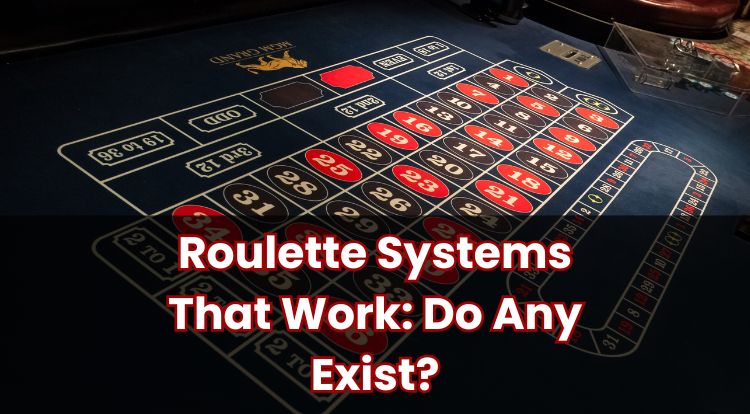7 Proven Roulette Systems for Beginners Uncovered
Roulette attracts many newcomers, both in casinos and online. The spinning wheel, colourful betting layout and various betting options can seem somewhat complex at first. Some players use structured approaches to placing bets, which can provide a clearer framework for how to manage stakes.
Exploring common roulette systems could help to make the game easier to understand. However it might be helpful to keep in mind that no system can change the randomness of the wheel or produce consistent outcomes, and all regulated games are designed to operate fairly.
Read on to learn more about roulette systems and how they can help players to organise their bets.
What Are Roulette Systems and How Do They Work?
A roulette system is a method for deciding how to place bets. Instead of adjusting stakes randomly, a player follows a pattern. This can involve increasing or decreasing wagers depending on previous outcomes or focusing on certain bet types such as red or black.
These patterns do not affect the outcome of the wheel. Each spin is independent and unpredictable. Online roulette uses Random Number Generators (RNGs), and live tables use properly maintained wheels. All results are audited and tested for fairness.
Roulette comes in different versions. European roulette has a single zero, while American roulette has a single zero and double zero, which slightly changes the odds. Checking the game rules before playing could potentially help you understand how the wheel and bets operate.
If you do decide to try your hand at roulette, remember to do so responsibly and within your means; never wager more than you can afford to lose.
7 Simple & Proven Roulette Systems for Beginners Uncovered
Below we summarise some of the most common systems, how it adjusts stakes, and points to consider, such as table limits that may restrict progressions.
Martingale System Explained
Martingale is a classic method for even-money bets, like red or black. You select a base stake, for example £1. If a bet loses, the next stake is doubled. After a win, the stake returns to the base amount.
This system can result in stakes increasing quickly during losing sequences. Table limits and personal budgets may restrict how far the progression can continue. Keeping sessions short and monitoring limits could help manage stakes.
Reverse Martingale System Explained
Reverse Martingale, also known as Paroli, increases stakes after a win and returns to the base stake after a loss. For example, starting at £1, a win could lead to a next bet of £2. After another win, it could increase to £4. A loss returns the stake to £1.
Some players decide in advance how many consecutive wins to aim for before resetting to the base stake. This approach allows smaller stakes during losing sequences and larger stakes during short winning sequences, without implying guaranteed outcomes.
D’Alembert System Explained
D’Alembert involves small adjustments to stakes. Following a loss, the stake increases by one unit. After a win, it decreases by one unit. This system is commonly applied to even-money bets.
The increments are moderate, so changes in stake size are less dramatic than with Martingale. Long sequences of losses can still increase stakes beyond expectations, so table limits and personal spending considerations are relevant.
Fibonacci System Explained
Fibonacci follows a sequence in which each number is the sum of the previous two, such as 1, 1, 2, 3, 5, 8. After a loss, the next stake moves one step forward in the sequence. After a win, it moves back two steps. Using £1 as the first unit is common.
The sequence increases gradually at first, which can make managing stakes easier. It may require multiple wins to offset earlier losses if the sequence advances several steps, as the system does not change the house edge.
Labouchere System Explained
Labouchere uses a written sequence of numbers. A simple sequence might be 1, 2, 3. The stake is the sum of the first and last numbers in the list, for example £1 plus £3 equals £4. If the bet wins, the first and last numbers are removed. If it loses, the lost stake is added to the end of the sequence.
The aim is to eliminate all numbers in the sequence. Losing streaks can extend the sequence and increase stakes. Labouchere involves careful tracking and is suited to players who want to record each step.
Flat Betting System Explained
Flat betting keeps stakes consistent regardless of outcomes. For example, you might place £1 on each spin without changing it.
This method allows focus on learning the table layout and understanding payouts. Flat betting could make it easier to see how much has been wagered over time, as stake amounts remain the same.
Paroli System Explained
Paroli follows the same principle as Reverse Martingale. Stakes increase after wins and return to the base stake after losses. Players can set a target number of consecutive wins before returning to the base amount to manage growth during winning sequences.
Checking table limits could be a helpful habit to get into regardless of the system, as limits may restrict how patterns function in practice.
Which Roulette System Is Easiest for Beginners?
For most new players, flat betting is one of the simplest ways to begin. You select a stake and keep it the same for each spin, without needing to follow complex sequences or adjust after every result. This allows you to focus on learning the layout of the wheel and understanding how different bets are structured.
It could also make it easier to monitor your spending. For example, if you place £1 per spin, you can quickly see how many wagers fit within the amount you have set aside for entertainment. Many people find that even-money bets, such as red/black or odd/even, provide a straightforward way to familiarise themselves with the pace of play.
For those looking for a slightly more structured approach without complicated calculations, systems like D’Alembert or Paroli introduce small adjustments to stakes. These methods require more attention than flat betting, so they tend to be more suitable once you are comfortable with how the table operates.
Are Roulette Systems Allowed in Online Casinos?
Most online casinos permit players to follow their own staking patterns. Bets can be placed manually and adjusted according to the chosen system, as long as the site’s rules are followed.
Methods that interfere with fair play, such as automated betting software or attempts to manipulate outcomes, are not allowed. Online roulette outcomes are produced using RNGs or live-dealt games and are independently tested.
It might be a good idea to review the terms and conditions and table limits on each game screen. Customer support can provide clarification if necessary.
How Can Beginners Use Roulette Systems Responsibly?
Licensed sites in the UK offer tools such as deposit limits, reality checks and time-outs, which make it easier to manage your spending without breaking your flow.
It could help to see roulette as entertainment and to remember that no staking pattern can change the built-in house edge. Most platforms show balance, stake size and recent bets, so you can keep an eye on how the session is going.
Support is available if you ever need it. Independent advice and help can be found at BeGambleAware, and every licensed site provides links to further assistance and self-exclusion tools.
**The information provided in this blog is intended for educational purposes and should not be construed as betting advice or a guarantee of success. Always gamble responsibly.
*All values (Bet Levels, Maximum Wins etc.) mentioned in relation to these games are subject to change at any time. Game features mentioned may not be available in some jurisdictions.




